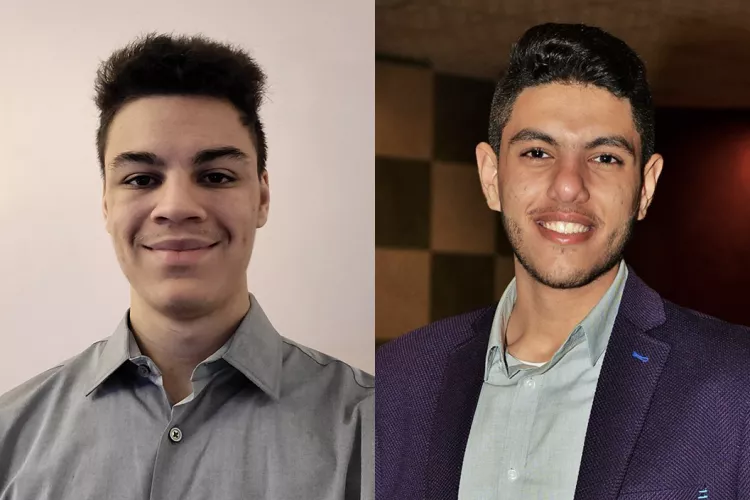The Front Lines of Change: Bringing Computer Science Education to Chester and Beyond

Kaidan Fullerton '23 (left) and Nader Almadbooh '23 are working together this summer to improve computer science education in underresourced communities like Chester.
For many Swarthmore students, the summer of 2020 has been a time of activism and agency as they organize, overcoming COVID-19 limitations, and work to make positive change in their communities through a variety of initiatives. This is the third in a series of stories about their effort and success in engagement for social justice.
Previously: Making the Black Experience Visible; Helping Low-Income Students Translate Their Experiences
Kaidan Fullerton ’23 has loved coding since high school. However, the lack of knowledge about computer science in the rural community of Felton, Del., meant that opportunities that some kids have starting in elementary school — like coding camps, hackathon events, and advanced classes — weren’t available to him. He was eventually able to persuade his school to offer AP Computer Science to him and five friends he enlisted. The course ended up being self-taught: The students met in an empty classroom while the instructor taught another class.
Fullerton’s passion for computer science stayed with him at Swarthmore, where he is on track to major in the subject along with mathematics. However, he wishes he could have learned it earlier, a sentiment shared by friend and fellow coder Nader Almadbooh ’23, a prospective engineering major from Bethlehem, Palestine.
Almadbooh took the popular introductory Python course CS21 and was “hooked,” he says.
“Computer science had always been, in my mind, that foreign, far-fetched field that is really hard to do,” he says. “But then it turned out that computer science is nothing more than problem solving — it really is.”
As a result, when Almadbooh and Fullerton decided to work together this summer, the idea to improve computer science education in underresourced communities came naturally.
Ashley Henry, program manager of the Lang Center for Civic & Social Responsibility, took interest in their idea and offered them the opportunity to create and teach a summer coding program as part of the Chester Community Fellowship (CCF), a summer program funded through the Swarthmore Foundation. CCF sends several students each year to work with community organizations in the neighboring town of Chester, Pa.
Soon, the pair had support from the College’s Computer Science Department, as well. Visiting Assistant Professor Jeff Knerr, who taught Almadbooh’s CS21 course, gave them access to his course materials. Professors Kevin Webb and Lisa Meeden also checked in with the pair periodically to offer feedback on their work.
While the COVID-19 prevented Almadbooh and Fullerton from hosting the camp, they used the limitations as an opportunity to make their project even more accessible, impactful, and durable. In addition to designing in-person activities for their community partners in Chester, the pair produced an open-access, online course that students can complete on any device with internet without any additional software required.
Modeled after CS21, the course introduces students to Python coding basics, such as logic statements, loops, and functions. Students can access all content via a landing page ordered by lesson. The course includes lecture videos complete with examples and practice problems using Python; complementary Google Colaboratory “notebooks” with written explanations, notes, and code blocks featured in their videos that students edit and run; and access to an online integrated development environment for students to create and save their projects.
To make their production professional, the pair purchased tools such as video cameras and microphones with their Lang Center stipends. Almadbooh, who currently lives on campus, borrowed a camera and microphone from the College and purchased a graphic drawing tablet, which allowed him to represent computer science concepts visually and take students through written examples in videos.
Fullerton views their unexpected change of plans positively; he believes that if he and Almadbooh had designed a camp, it would have reached far fewer people. Their online course can reach anyone in the world, including those without physical resources like software and textbooks — which he didn’t have in his own high school course. “That’s where online courses shine,” he says.
Almadbooh is also optimistic about the impact the course can make.
“I’m now considering majoring in computer science because of what I learned,” he says, “and people in Chester deserve a similar experience, too.”



